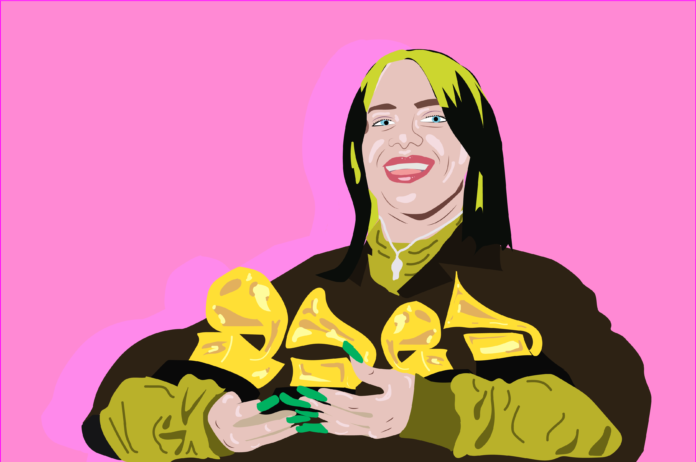Billie Eilish’s success is a combination of hard work, privilege
Thank you, Billie Eilish, for making me feel that I have nothing to show for in my life. At 18, she won five Grammys and made herself one of the most magnetic figures in the music industry. At 18, I spent my senior year making origami and clearing the loose trail mix out of my backpack.
Eilish’s story intrigues the masses simply because she used to be “normal” — like one of us. She grew up in Highland Park, a neighborhood in Los Angeles that’s just a stone’s throw away from mine. She loved Justin Bieber and was homeschooled, all qualities that could be attributed to any of us. Her age makes her emotionally closer to her demographic of listeners.
Eilish’s talent is undeniable. She honed her craft alongside her brother and producer Finneas O’Connell in their childhood home. Many students can say they’ve thrown together a song for a class project, but not everyone can say their work has gone triple platinum. That’s Eilish’s “Ocean Eyes.”
O’Connell and Eilish rose to fame at an astonishing rate. Critics call Eilish an “industry plant,” a term that basically means we were swindled by her seemingly organic rise to fame. It’s a term that denounces the “zero to hero” ideal touted by artists like Justin Bieber and Chance the Rapper.
I don’t think Eilish is an industry plant, but I find that some of her practices and ideologies often conflict with what her proposed persona should reflect.
O’Connell and Eilish often detail how much hard work they put into their records. In a Rolling Stones interview, they do exactly this — mull over every point of production in “bad guy” and tell funny stories about the way their hit song came to be.
Making music is hard work, but attributing success to solely hard work is a pretty unrealistic view of the rise to stardom. Eilish and O’Connell are wrought with privilege, which they often reject as the source of their success, instead favoring the narrative of success through hard work.
I have no doubt that hard work contributed to their success, but their hard work is recognized largely because of their privilege. Lots of people work their tails off to make music, but not everyone becomes the world’s biggest pop star as a result. People dedicate hours to their uploads and don’t get nearly as much overnight fame and acclaim. Working hard is not the only factor at play here.
Oftentimes, privileged people reject the label of “privileged” because of the stigma it carries: that privileged people have had perfect, easy lives. But this is a common misconception. Having privilege means that certain societal institutions benefit certain groups of people for no other reason than superficial qualities.
In an interview with Pitchfork, Eilish outright said that parents are “lazy” if they send their children to school instead of homeschooling. This is obviously not the case at all. As one of the kids who got picked up last at after school care, I can safely say that my parents were not lazy. The services that my elementary, middle and high schools provided made it easier for my parents to work full-time jobs while my brother and I recieved education. Homeschooling is a matter of being able to afford not to work, so her comment reflects blatant ignorance of the reality in most people’s lives.
It’s also worth noting that a large part of Eilish’s appeal is her look: piercing blue eyes, unique hair dye and a fascinating fashion sense. She’s gorgeous. It’d be unfair not to attribute some of her success to her inherent marketability. As a white person, it’s easier to break onto the music scene and succeed because you are what is most digestible to the masses.
Remember how Taylor Swift won Best Album for “1989” over Kendrick Lamar’s “To Pimp A Butterfly?” Yeah, I wish I didn’t either. The next year, Beyoncé’s “Lemonade” lost to Adele’s “25,” perpetuating the Recording Academy’s long-standing tailoring of the music scene to fit a majorly white ideal.
Considering their age and newness to the public eye, Eilish and O’Connell would benefit from addressing their privilege outright. They brand themselves as raw, real and honest people, discussing everything from dealing with fame to mental health. Owning up to their privilege would work to reinforce these features of their persona. I also think it’d be refreshing to see young artists breaking the mold not only in terms of their work but in the social sphere.
That said, I am a huge fan of Eilish. I believe it’s important to be critical of those who shape our cultural narrative. In doing so, we help shape the culture we aspire toward.
Written by: Isabella Chuecos – ifchuecos@ucdavis.edu
Disclaimer: The views and opinions expressed by individual columnists belong to the columnists alone and do not necessarily indicate the views and opinions held by The California Aggie






“Homeschooling is a matter of being able to afford not to work, so her comment reflects blatant ignorance of the reality in most people’s lives.” And this reflects blatant ignorance of Eilish’s upbringing. Her parents worked several jobs to support the family and at times barely scraped by, nearly losing their house at one point, so asserting that her parents homeschooled because they didn’t work shows your lack of research. Making assumptions based on you own prejudice weakens your argument.
Classic passive- aggressive approach to Billie. The only “privileged” I see listed here is that she is “white” Shame on you for using the race card for clicks. There is really no purpose to this article. A millionaire still living in her 1200 Square foot cildhood home speaks volumnes more then a single word of your article addressing her privilege. Swing by her house. I dare you.